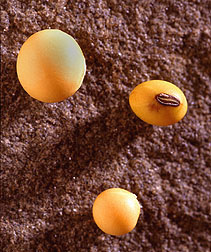New Soybeans Fill Tofu Niche
Mike Baker, manager of North Carolina Foundation Seed Producers, frequently has tofu on his mind these days. But his hunger is for finding opportunities to help small-scale farmers in North Carolina.
As a foundation seed manager, Baker is responsible for helping farmers get access to new, publicly released plant lines. But he's also concerned with giving growers marketing advantages.
"Larger farms work on volume, and time is precious. But small-scale farmers need to get the most money they can out of every acre," he says. "A tofu crop demands meticulous care, but you get compensated for that extra effort."
Tofu is actually a cheese analog made from soybeans.
Soybeans for tofu differ from those grown for livestock. Farmers who grow tofu soybeans earn premiums for the extra care involved in producing them. The market demands their soybeans be larger and free of chips or stains.
All this extra work can result in profits but a grower needs to either find a buyer with the right contacts in Japan or establish a working relationship with the U.S. tofu industry. Farmers in Arkansas used a USDA natto variety called Pearl to help them get connected. Natto refers to a fermented form of soybeans used in Asian foods that can be made from these soybeans.
"We saw what was happening in Arkansas," says Baker. "We decided it was time for our growers to get part of the action."
Pearl, released through Baker's foundation, was bred by Agricultural Research Service geneticist Tommy Carter at the agency's Soybean and Nitrogen Fixation Unit's Raleigh, North Carolina, lab. It's a smaller soybean, as that's what's required for natto soybeans.
USDA's Economic Research Service estimates the Japanese consume 20 million bushels of soybeans for tofu annually, mostly imported from China and the United States.
But tofu isn't just an export product. Right now, there are about 100 U.S. tofu processors, and their product represents $130-$150 million in retail value. All the tofu consumed in this country is made from American-grown soybeans, but less than 1 percent of U.S. soybean crop is used for tofu.
U.S. shoppers are doubling their consumption of tofu about every 3 to 4 years, according to the Soyfoods Center of Lafayette, California, which monitors such trends. One possible reason: research suggesting soybean phytoestrogens can do everything from ease menopausal discomforts to cut the risk of heart attacks and cancers. Immigration from Asia, increase in vegetarianism, and curiosity about this Asian-based food have also contributed to its growing popularity.
All this has convinced Mike Baker that the time for tofu is now, and that the ARS lab in Raleigh is a crucial ally. From the lab, Carter travels to Japan and China in search of soybean germplasm that can be developed into new American-bred tofu varieties.
Carter's latest success is four tofu lines under review for release. Of the four, the code-named "NTCPR92-40" stands out, he says. It's three times bigger than Pearl and also has high protein, with yields just 5 percent less than conventional soybean varieties.
Baker sees these new lines as having potential to open the tofu market for North Carolina growers.
"These are clear-eyed soybeans, which means the round spot on the hull isn't brown and the seed coat and its meat are a creamy yellow-white," Carter says. "We've also come out with six new natto soybean lines."
Right now, the Midwest is the hot spot for tofu. That's why Baker made a trip there recently. But Baker says midwestern soybeans won't thrive in the Southeast, and Japanese buyers are interested in diversifying their production areas.
"The lines Carter develops will be ideal for growing conditions on the farms I represent," he says. — By Jill Lee
Thomas E. Carter is at the USDA-ARS Soybean and Nitrogen Fixation Research Laboratory, 3127 Ligon St., Raleigh, NC 27695-7620; phone (919) 513-1480







